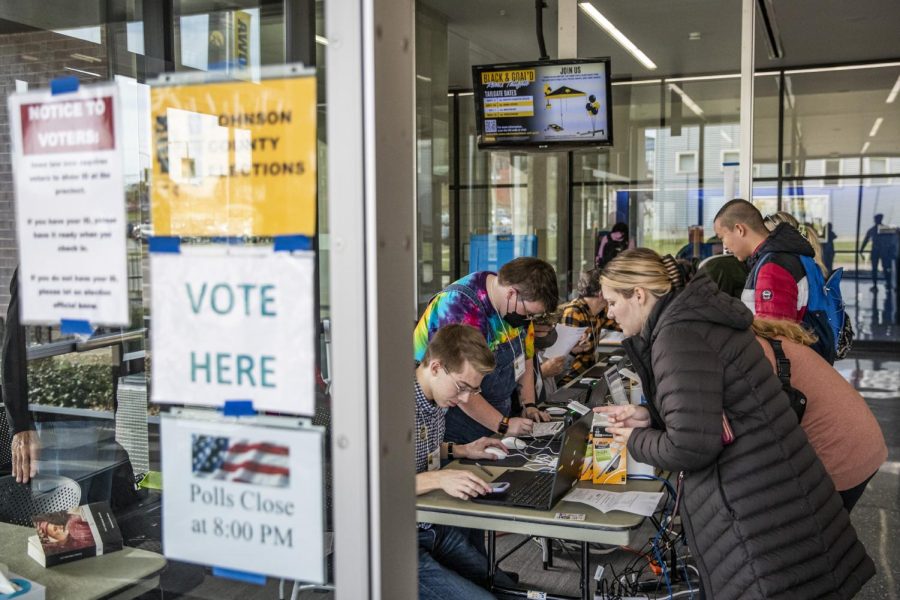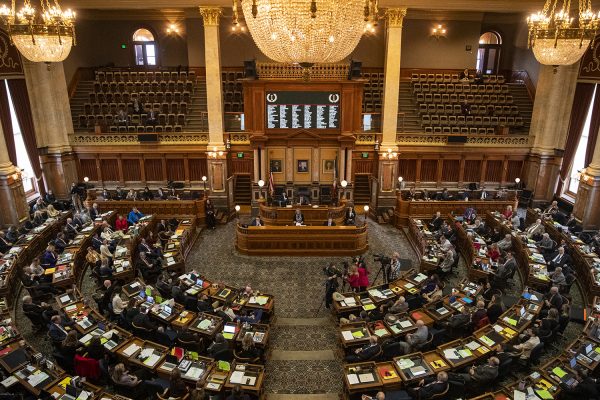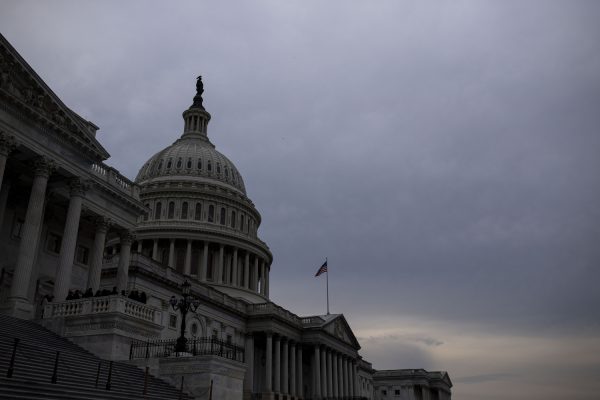Election roundup: The results of every midterm race, simplified
Voters get set up to vote on Election Day at the University of Iowa Campus Recreation and Wellness Center in Iowa City on Tuesday, Nov. 8, 2022.
November 11, 2022
Governor
Iowa Gov. Kim Reynolds will remain in power after winning her reelection bid on Tuesday night. She beat a challenge from Democrat Deidre DeJear and Libertarian Rick Stewart, winning with 58 percent of the vote.
She campaigned by highlighting her record during the pandemic by implementing minimal restrictions and making masking in schools optional before most states. She’s also championed funding private schools through voucher programs, legislation that did not become law during the last session in the Iowa Legislature.
U.S. Senate
Sen. Chuck Grassley was reelected on Tuesday to the U.S. Senate for his 41st consecutive year in the position. Grassley won a challenge from Democrat Mike Franken, earning 56 percent of the vote. Grassley campaigned by showcasing his fiscal responsibility and voting attendance in the Senate. If Grassley finishes out his eighth term in 2028, he will be the third longest-serving U.S. Senator in history.
1st Congressional District
Republican Rep. Mariannette Miller-Meeks was reelected to represent Iowa’s 1st Congressional District late Tuesday. She ran against Democratic state Rep. Christina Bohannan, and the incumbent won the challenge with 53.3 percent of the vote, a far larger margin than her 2020 victory, when she won by just six votes.
Miller-Meeks ran on the platform of making prescription drug prices affordable to Iowans, limiting access to abortion, and protecting Iowan’s gun rights.
2nd District
Incumbent Republican U.S. Rep. Ashley Hinson won reelection with 54 percent of the vote in a race against Democrat Liz Mathis. Hinson campaigned on a few popular conservative ideas during this election cycle. She also emphasized parental rights in education — a prevalent issue in Iowa — being tough on crime, immigration, and inflation in her campaign.
3rd District
Republican Zach Nunn unseated incumbent Democrat U.S. Rep. Cindy Axne in the 3rd Congressional District. Nunn edged out Axne by just over 2,000 votes, according to unofficial results from the Iowa Secretary of State. It comes among a flurry of Republican victories for incumbents and challengers across the state. Nunn campaigned on strengthening first and second Amendment rights, cutting taxes, supporting police, and limiting abortion.
4th District
Republican U.S. Rep. Randy Feenstra was reelected with 67.32 percent of the vote. He won against challenges from Democrat Ryan Melton and Libertarian Bryan Jack Holder. Feenstra supports former President Donald Trump’s tax cuts and Gov. Reynolds’ legislative ban on sanctuary cities in the country. Feenstra also supports the passage of the fetal heartbeat bill, which makes abortion a criminal offense if it is determined the fetus has a heartbeat.
State Executive Branch
Republican Brenna Bird won the Attorney General’s race with 50.8 percent of the vote. Incumbent Democrat Tom Miller was the country’s longest-serving attorney general for holding the position for nearly 40 years.
Additionally, Republican Roby Smith unseated Democratic incumbent Treasurer Michael Fitzgerald with 51.3 percent of the vote. Smith plans to improve financial literacy for teens and young adults and protect Iowan’s financial privacy.
Incumbent Republican Secretary of State Paul Pate won his reelection against a challenge from Democrat Joel Miller with 60 percent of the vote. Pate wants to continue to support voter ID laws, make voting accessible for active-duty military, and reduce government bureaucracy for efficient processing for Iowa businesses.
Incumbent Republican Secretary of Agriculture Mike Naig won against Democratic challenger John Norwood with 61.1 percent of the vote.
The State Auditor’s race has not yet been called as of Thursday night. Incumbent Democratic Auditor Rob Sand currently leads his Republican challenger Todd Halbur, though the margin is just under 3,000 votes as of Thursday morning and Halbur has called for a recount.
State Senate, District 43
Democratic Sen. Zach Wahls, D-Coralville, was reelected to Iowa Senate after running unopposed in District 43. He won 97 percent of the vote, with 3 percent of the vote going to write-ins. Before his election to the Iowa Senate, Wahls advocated for LGBTQ+ rights to the Iowa state government, speaking before the Iowa House Judiciary Committee about marriage equality for the LGBTQ+ community in 2011. Wahls has also sponsored bills related to funding Iowa’s small businesses and public schools, such as small business relief programs and funding for a statewide preschool program.
State Senate, District 45
Democrat Janice Weiner won the Iowa Senate District 45 election in a race against Republican Harold Weilbrenner. As a senator, Weiner said she will prioritize funding for public education and increasing pay to child care workers. Weiner’s platform also places an emphasis on women’s rights in a post-Roe v. Wade country. Her campaign advocates for access to birth control, STD testing, abortion rights, and resources that will allow for annual healthy women screenings, safe childbirth options, and help for those in domestic violence situations.
State Senate, District 46
Republican Dawn Driscoll defeated Democrat Kevin Kinney with 53.98 percent of the vote. Both Driscoll and Kinney were incumbent state senators drawn into the same district in the redistricting process. Driscoll’s campaign places an emphasis on cutting taxes for Iowans. During her time as a state senator, Driscoll has worked to eliminate a property tax levy and the death tax.
Iowa House, District 90
Democrat Adam Zabner won the election to Iowa House 90 with 98 percent of the vote after running unopposed. This will be Zabner’s first term in the Statehouse and at 23 years old, he will be the second Latino member of the Iowa Legislature. He campaigned on funding Iowa’s schools, restoring bargaining rights for unions, and making Iowa a welcoming place for immigrants.
Iowa House, District 89
Democrat Elinor Levin beat Republican candidate Jacob Onken in the race for Iowa House District 89, receiving 82 percent of the vote. As an Iowa House representative, Levin plans to strengthen public unions and public school funding, support common sense gun laws, and help create infrastructure that will lead to reliable, high-speed Internet service and renewable energy across Iowa.
Iowa House, District 86
Rep. Dave Jacoby, D-Coralville, was reelected to the Iowa House with 98 percent of the vote in an uncontested race. As a representative, Jacoby states he will use his experience in education and finance to implement core funding over a five-year period instead of the current late annual allocations used by the education system.
Johnson County Board of Supervisors
Democrats Jon Green and V Fixmer-Oraiz won the two open seats for the Johnson County Board of Supervisors. Fixmer-Oraiz won 31.7 percent of the vote and Green won 35 percent of the vote on Tuesday. Green and Fixmer-Oraiz ran against Republicans Phil Hemingway and Jammie Bradshaw — who won 17.2 percent and 14.2 percent of the vote respectively and Independent Eric Heick, who won 1.7 percent.
Green campaigned on using the $29 million in funds the county received from the American Recovery Plan Act (ARPA) to be “distributed in a prioritized manner,” pushing for creating more affordable housing, police reform, and others.
Fixmer-Oraiz campaigned on issues such as inclusive economic development, affordable housing, racial equity LGBTQ+ inclusion, connectivity and mobility, and climate resilience and COVID-19 recovery.
State Constitutional Amendment
Iowans voted to amend the state constitution to add a right to bear arms when they were given the opportunity on Tuesday night, with 65 percent of Iowans voting in favor. The amendment changes the way the right to bear arms is interpreted in the courts by adding a condition of strict scrutiny. The strict scrutiny provision means that no law can be made that will restrict the sale or ownership of firearms unless absolutely necessary.















